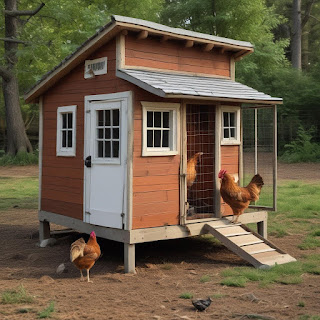In recent years, there's been a growing interest in sustainable living and reducing household waste. One innovative way to address organic waste is by keeping chickens. Not only do these feathered friends provide fresh eggs, but they also serve as efficient recyclers of kitchen scraps. If you're considering starting your own chicken coop, here’s how it can help you manage organic waste and tips for maintaining a coop, even in a small space.
Chickens as Organic Waste Recyclers
Chickens are natural scavengers, and they love to eat many types of food scraps that would otherwise end up in the trash. Vegetable peels, fruit scraps, grains, and even leftover rice can all be fed to your chickens. Not only does this reduce the amount of waste sent to landfills, but it also provides your chickens with a varied diet, which can improve the quality of their eggs.
Moreover, the manure produced by chickens is rich in nutrients and can be composted to create a high-quality fertilizer for your garden. This creates a complete cycle where your household waste feeds your chickens, and in turn, their manure feeds your plants.
Tips for Building a No-Smell Chicken Coop
One concern many people have about keeping chickens is the potential for bad odors. However, with a few simple strategies, you can keep your chicken coop clean and odor-free:
Proper Ventilation: Ensure your coop has adequate ventilation to allow fresh air to circulate. This will help reduce moisture buildup, which is a common cause of bad smells.
Use Absorbent Bedding: Opt for bedding materials like pine shavings or straw, which are both absorbent and easy to clean. Regularly change the bedding to prevent the buildup of ammonia from chicken droppings.
Regular Cleaning: Establish a routine for cleaning out the coop. Remove soiled bedding and droppings regularly to keep the coop clean and fresh.
Deep Litter Method: This method involves adding layers of bedding over time, allowing the lower layers to compost naturally. It can help control odors and reduce the frequency of coop cleaning.
Add Herbs: Placing aromatic herbs like mint, lavender, or rosemary in the coop can help mask odors and keep the area smelling pleasant.
Building a Chicken Coop in a Small Space
You don't need a large yard to keep chickens. With a bit of creativity, you can build a compact and efficient chicken coop, even in a small urban space:
Vertical Space: Utilize vertical space by building a multi-level coop or adding nesting boxes that are stacked on top of each other. This maximizes the area your chickens have to move around.
Portable Coops: Consider a mobile coop, also known as a chicken tractor, which can be moved around your yard. This allows chickens to access fresh grass and bugs, reducing the need for a large permanent coop.
Shared Spaces: If you have a garden, you can integrate the chicken coop into the garden design. Chickens can help with pest control and fertilization as they forage, saving space and benefiting your plants.
Additional Benefits of Keeping Chickens
Aside from waste management, chickens offer several other advantages:
Fresh Eggs: One of the most obvious benefits is a steady supply of fresh, organic eggs. The taste of home-raised eggs is often superior to store-bought varieties.
Educational Opportunities: Raising chickens can be a fun and educational experience, especially for children. They can learn about responsibility, animal care, and where food comes from.
Pest Control: Chickens naturally forage for insects, helping to control pests in your yard or garden.
Connection to Nature: In an increasingly digital world, tending to chickens can provide a calming routine and a deeper connection to nature.
Conclusion
Keeping chickens is a rewarding way to manage your organic waste, even if you don't have a large backyard. With a well-maintained, odor-free coop, you can enjoy the benefits of fresh eggs, nutrient-rich compost, and a more sustainable lifestyle. Plus, you'll have the added joy of watching your chickens scratch, peck, and roam around your yard. So why not give it a try? Your garden, your waste bin, and your breakfast table will thank you!



No comments:
Post a Comment